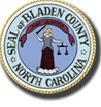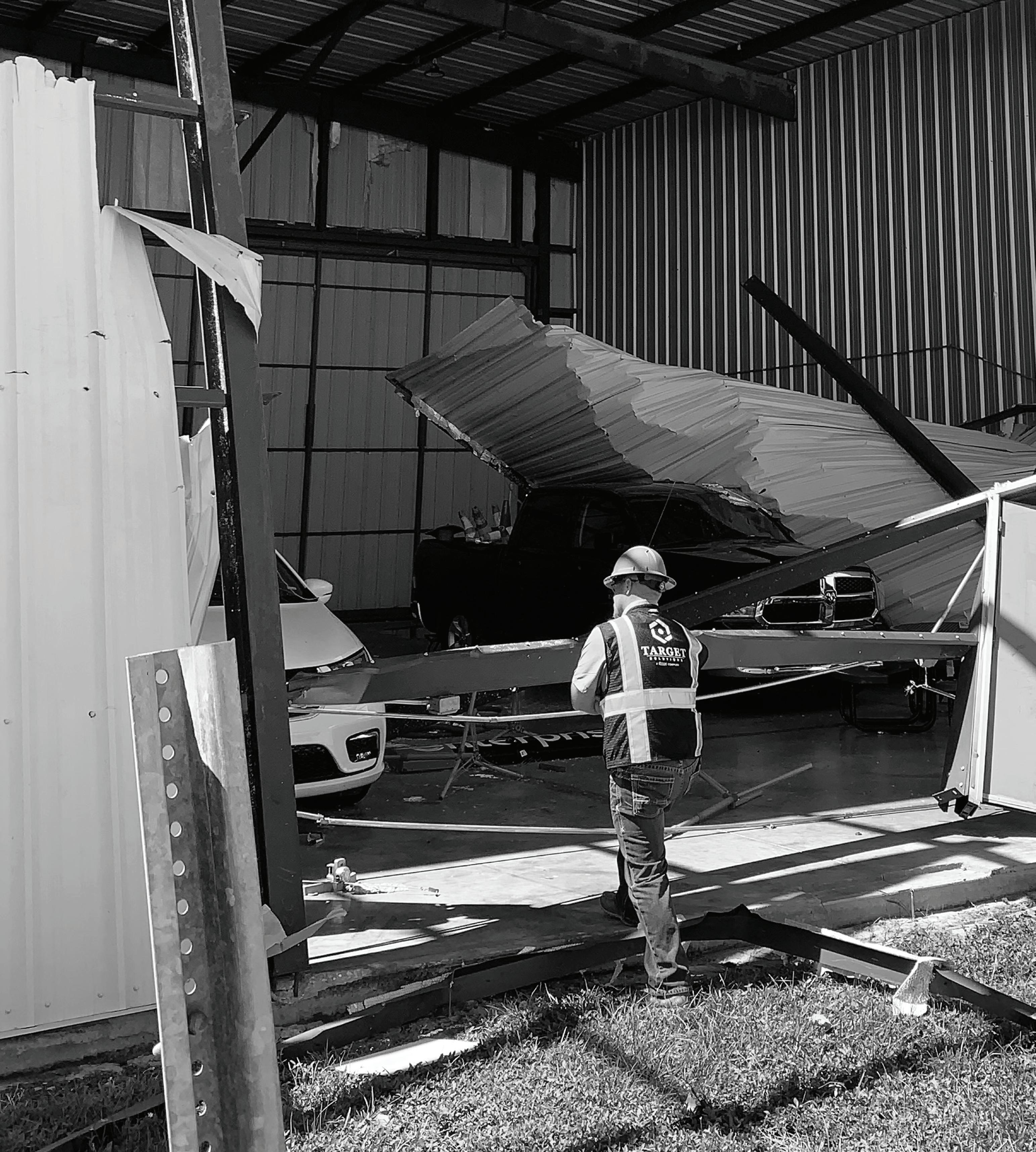HURRICANE GUIDE
2023
ATLANTIC HURRICANE NAMES

HAROLD
IDALIA JOSE KATIA
LEE
MARGOT
NIGEL
OPHELIA
PHILIPPE
RINA
SEAN
TAMMY
VINCE
WHITNEY



2023
ATLANTIC HURRICANE NAMES

HAROLD
IDALIA JOSE KATIA
LEE
MARGOT
NIGEL
OPHELIA
PHILIPPE
RINA
SEAN
TAMMY
VINCE
WHITNEY


It is important to have your preparedness materials and plans ready for your business.

MAKE A BUSINESS CONTINUITY AND RECOVERY PLAN
Resources such as the Carolina Small Business Development Fund and Small Business Administration (SBA) offer helpful guides and checklists to get started.
server or on removable media such as a USB flash drive.
TAKE INVENTORY AND SECURE EQUIPMENT
Identify items you can take with you such as phones and laptops. Larger items that cannot be moved, such as a copier, should be documented and photographed for insurance.
KEEP IMPORTANT CONTACT INFORMATION HANDY
REVIEW
Ensure you have enough coverage. If you lease your business space, talk to your building owner to review their insurance policy and their disaster plan.
INSPECT YOUR PROPERTY
Note any repairs that need to take place. If you see visible roof damage, contact a roofing expert to address those issues and conduct a thorough inspection. Looks for areas on your structure where water and wind damage could occur.
The National Hurricane Center will issue tropical storm or hurricane watches. This is your cue to put your storm plan into action and listen to local officials and trusted media closely.

This includes your insurance information and vital business records. Any electronic information should be saved to a cloud-based
This includes utility providers, insurance agents, your landlord if you lease, and anyone you may need to contact about your business operations before, during, and after the storm.


MAINTAIN UPDATED CONTACT INFORMATION
Keep employees in contact with each other in the event you must evacuate the area or will need to conduct operations remotely.
IDENTIFY HOW YOU WILL COMMUNICATE
Customers and employees need to be notified with out of office and operational information. Tools such as your business line answering message, email contact list, or social media can be utilized to relay important information.
Now is the time to finish up your hurricane preparedness plan and follow directions from local officials. If you are evacuating, share your plans with co-workers, and family outside of the affected area. If you are sheltering in place, finish your preparations at home to ride out the storm.
If you are leasing your space, contact your lease owner and make sure they have contacted their insurance agent. Document and photograph any damage to your space.
Once a federal disaster declaration is issued for the area, FEMA will collect your information and provide you with a registration number. Their website is DisasterAssistance.gov.
They will connect you to the appropriate organizations for further assistance. A business counselor will reach back to you within two business days. Call 800-228-8443.
Visit the Business Recovery Website that is operated by the Small Business and Technology Development Center (SBTDC). Their team will provide you with updates on disaster declarations and services available to businesses. Their website is SBTDC.org.
The SBTDC or the Small Business Center Network can provide confidential, oneon-one counseling to assess financial impact, reconstruct financial statements, evaluate options with creditors, prepare loan applications and more.
Options such as the NC Rural Center’s Thread Capital Rapid Recovery Loan and the U.S. Small Business Administration

Disaster Loan are available to help both your business and your personal property.
You may also be eligible for Disaster Unemployment Assistance which provides temporary payments to those in federally declared disasters whose employment has been lost or interrupted. Business owners that are self-employed, farmers or commercial fishermen who are unemployed as a direct result may be eligible. Their website is des.nc.gov.

Databases such as the NC Department of Administration Office for Historically Underutilized Businesses (HUB) provide information for those looking for qualified vendors, including good, services and construction.


Always call 911 in an emergency. Below are non-emergency numbers that will connect you to storm related information and resources.

Lower Cape Fear Water and Sewer Authority provides wholesale regional water from the Cape Fear River at the Kings Bluff Pump Station behind Lock and Dam #1 in Bladen County. Bladen, Brunswick, Columbus, New Hanover and Pender Counties comprise our five-county service area.





T he Mission of the LCFWASA is to assist in providing water and related services that enhance the quality of life in the region. Originally, created as the Wilmington-New Hanover County Water and Sewer Authority in 1970, we took our current name in 1971.


I n 1984, the Kings Bluff Pump Station was placed into service and expanded in 2008. A 60-inch parallel intake was installed in 2011. The 54-inch parallel transmission line has been completed and has increased capacity from 45 to 80 million gallons-a-day without any equipment upgrades. Brunswick County Utilities and Cape Fear Public Utilities constructed this line which is now part of the LCFWASA system. There are plans underway now to parallel the last 10-mile section of line to give the Authority true and complete redundancy. This is a great move to keep the region prepared for Emergency Conditions.
T he Kings Bluff Pump Station has not been out of service for 19 years, surviving a line break during Hurricane Matthew and severe flooding during Hurricane Florence. w ww.lcfwasa.org





CATEGORY 1
74-95 mph
Dangerous winds, some damage expected.
NOTABLE CAPE FEAR
REGION STORMS:
Hurricane Florence (2018)
CATEGORY 2
96-110 mph
Extremely dangerous winds, extensive damage.
NOTABLE CAPE FEAR
REGION STORMS:
Hurricane Bertha (1996)
Hurricane Bonnie (1998)
Hurricane Floyd (1999)


CATEGORY 3

111-129 mph
Devastating winds and damage expected.
NOTABLE CAPE FEAR
REGION STORMS: Hurricane Fran (1996)
CATEGORY 4
130-156 mph
Catastrophic damage expected.
NOTABLE CAPE FEAR
REGION STORMS: Hurricane Hazel (1954)
CATEGORY 5
157+ mph
Catastrophic damage expected.
NOTABLE CAPE FEAR
REGION STORMS: North Carolina has never had a category 5 landfall
You can find more resources and links at: WilmingtonHurricane.com
STORM SURGE WATCH TIME TO PREPARE
Life-threatening inundation from rising water moving inland from the shoreline is expected within 48 hours. Stay advised of any evacuation orders.
STORM SURGE WARNING FINISH PREP
Life-threatening inundation from rising water moving inland from the shoreline is expected within 36 hours. Evacuate if ordered to and finalize preparation.
TORNADO WATCH KNOW YOUR SAFE PLACE
When a watch is issued, you need to be prepared to take shelter if a warning is issued.
TORNADO WARNING TAKE SHELTER NOW
The safest places to be are the lowest level of your structure and in the most interior area away from windows and doors. Mobile homes and automobiles are not safe places to shelter.
TROPICAL STORM WATCH TIME TO PREPARE
Tropical storm conditions (winds of 39-73 mph) are expected within 48 hours. Begin storm preparations.
TROPICAL STORM WARNING FINISH PREP
Tropical storm conditions (winds of 39-73 mph) are expected within 36 hours. All preparations should be rushed to completion. Voluntary evacuations may be issued.
HURRICANE WATCH TIME TO PREPARE
Hurricane conditions (winds of 74 mph or more) are expected within 48 hours. Begin preparations and review your hurricane plan. Plan for possible evacuation and listen for instructions from local officials.

HURRICANE WARNING FINISH PREP
Hurricane conditions (winds of 74 mph or more) are expected within 36 hours. All preparations should be rushed to completion. Evacuate area if directed.
As North Carolina braces itself for the upcoming 2023 hurricane season which estimates to include 11 to 15 named storms, the state's residents and businesses are seeking ways to enhance their resilience and minimize the potential impact of these potentially devastating storms. In recent years, the combination of solar energy and energy storage systems has emerged as a promising solution, offering reliable and sustainable power during and after extreme weather events.
Based on early forecasts, North Carolina is expected to experience an above-average hurricane season in 2023. The combination of warm Atlantic waters, conducive wind patterns, and other factors creates favorable conditions for tropical storms and hurricanes to develop and impact the region. Given the state's vulnerability to such weather events, it becomes paramount to implement robust and sustainable solutions.
Solar energy has proven to be an invaluable resource for powering homes and businesses across southeastern North Carolina. The abundant sunshine in the region makes it an ideal candidate for solar installations, enabling home and business owners to generate their electricity while reducing their reliance on fossil fuels. Cape Fear Solar Systems based in Wilmington, NC, has been at the forefront of this renewable revolution—they have been the region’s top solar contractor since 2007.
Cape Fear Solar Systems offers customized solar solutions tailored to the unique needs of each customer. By utilizing state-of-the-art photovoltaic (PV) panels, they enable North Carolinians to harness the sun's energy and convert it into clean electricity. Not only does this reduce carbon emissions, but it also provides significant cost savings over the long term, making solar power an economically viable choice.
While solar energy is a reliable and sustainable source, the intermittent nature of sunlight can present challenges during extreme weather events, such as hurricanes. This is where energy storage systems come into play. By integrating energy storage solutions with solar installations, North Carolina home and business owners can enhance their resilience and maintain a stable power supply, even when the grid is down.

Energy storage systems, such as lithium-ion batteries, allow solar energy to be stored and used during times of high demand or when solar production is limited. In the event of a hurricane-related power outage, these batteries can provide backup power, ensuring
critical appliances and medical equipment remain operational. Cape Fear Solar Systems offers expertise in designing and installing energy storage solutions that seamlessly integrate with solar installations, providing a comprehensive and reliable energy solution.
Pairing solar energy with energy storage offers several advantages during hurricanes and their aftermath:
ENERGY INDEPENDENCE: Solar energy coupled with storage provides a degree of energy independence, reducing reliance on the grid and ensuring a continuous power supply, even in the event of widespread outages.
COST SAVINGS: Solar power allows homeowners and businesses to significantly reduce their electricity bills, while energy storage systems enable them to maximize the utilization of their solar-generated energy--further reducing costs.
ENVIRONMENTAL SUSTAINABILITY: By shifting to solar power, North Carolina residents can contribute to reducing carbon emissions and mitigating the effects of climate change.
QUICK RECOVERY: Solar installations with energy storage can help expedite the recovery process after hurricanes by providing immediate access to electricity, aiding relief efforts, and restoring essential services. Emergency response centers, hospitals, and critical infrastructure can continue to function, offering vital support to affected communities.
RESILIENCE AND RELIABILITY: Solar energy paired with energy storage enhances the resilience and reliability of the energy system. Even if the grid goes down, solar-powered homes and businesses can continue to operate, ensuring comfort, safety, and productivity during challenging times.
LONG-TERM INVESTMENT: Investing in solar energy and storage is a long-term strategy that pays off beyond hurricane seasons. The savings on electricity bills and potential incentives, such as net metering programs and federal tax credits, make solar installations an economically viable choice for homeowners and businesses alike.
COMMUNITY SUPPORT: Choosing Cape Fear Solar Systems as the preferred solar contractor not only ensures top-quality installations but also supports the local community. Working with a local company stimulates the regional economy, creates jobs, and fosters sustainable development within North Carolina.

Investing in solar energy and energy storage is a proactive step towards a more resilient and sustainable future for North Carolina. By harnessing the power of the sun, the state can reduce its carbon footprint, enhance energy security, and pave the way for a greener and more resilient tomorrow.
ROBERT PARKER Chief Operating OfficerRobert is a Wilmington native that graduated from the University of North Carolina at Chapel Hill with degrees in Economics and Environmental Studies. Robert is a NABCEP® PV Certified Solar Installer (#PV-041616-013206). Robert has been a guest speaker for NABCEP, Wilmington Cape Fear Home Builders Association, Cape Fear New Home Sales & Marketing Council and several environmental groups. Robert oversees all commercial solar installations for Cape Fear Solar Systems and has worked with many well-known area businesses to help them increase business profits using solar energy.

Regardless if there is a hurricane in the Atlantic or not, now is the time to start preparing your survival kits. Two kits are suggested – one for when you may need to evacuate and a kit for if you are sheltering at home during the storm.

Cash in the event that power outages disrupt ATMS and credit cards
Important documents such as ID cards and insurance information
Extra set of keys to your personal and business properties, as well as vehicles
Portable chargers for mobile devices
Bottled water and snacks such as protein bars and granola bars
First-aid kit with whistle
Flashlights for each member of your family
All items listed above plus:
One gallon of water per person, per day, for up to 7 days
Additional water for flushing toilets and bathing
Non-perishable food for up to 7 days
Paper and plastic eating utensils
Manual can opener and kitchen tools
Fire extinguisher
Waterproof matches
Plastic tarp and duct tape for quick repairs
Household sanitation items such as garbage bags and paper towels
Pet supplies for up to 7 days including food, medication, water, and pet ID information
Extra batteries
Battery operated or hand crank radio (including a weather radio)
Prescription list and a 14-day supply of medications
Personal sanitation items such as moist towelettes, soap, toothpaste and toothbrush, hand sanitizer, etc
Infant formula and diapers
Changes of clothing
Activities to keep small children distracted and occupied

Do you Know Your Zone? If evacuations are ordered in New Hanover, Pender and Brunswick counties, local officials will announce which zones should leave the area. The state of North Carolina has developed the Know Your Zone program for the state’s coastal communities that are most vulnerable to impacts from hurricanes, tropical storms, and other hazards. Higher risk areas in Zone A, such as our beach communities and those located along waterways, will typically be ordered first to evacuate. Then areas in Zone B, Zone C, etc. will be ordered as needed. Officials will use a tiered approach to avoid traffic jams during a mandatory evacuation. As evacuation orders are issued, follow local media and trusted state information sources for the latest information updates.


It’s crucial to have an emergency plan in place with a trusted disaster recovery partner. Target Solutions specializes in full-service commercial restoration and disaster recovery. Every project is approached with industry-leading experience, state-of-the-art technology, urgency and compassion. Our dedicated team of experts is available 24/7/365 and will work to quickly restore your business operations with minimal interruption.




